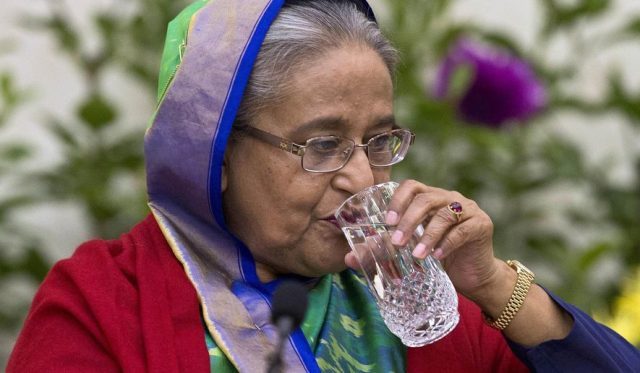GVS Online had republished an Opinion piece by Mohsin Raza Malik, on Jan 17, under the title, “Bangladesh: Hasina becomes a ruthless dictator” (originally published in The Nation). Writer, a lawyer, argued that in recent elections in which Sheikh Hasina’s party won 288 seats out of 298, were marred by allegations of rigging and ballot stuffing and even 2014 elections were controversial and that Hasina has become an “elected dictator” ruling over a “One party state” using laws like “Information & Communications Technology Act” and “Digital Security Act (DSA) that have curtailed civil liberties. Bangladesh High Commission in Islamabad has expressed serious reservations to this point of view. GVS publishes the rejoinder of High Commission, in full, without any editing. Readers eager to know both points of view can make their own judgments.
Editor, Global Village Space
— Global Village Space (@GVS_News) January 17, 2019
Dear Sir,
The article by Mr. Mohsin Raza Maliki published on 17 January 2019 in your esteemed web portal under the title “Bangladesh: Hasina becomes a ruthless dictator” has come to the notice of Bangladesh High Commission, Islamabad. The High Commission takes exception to the contents of the article and has the following comments:
The prejudiced and jaundiced article is full of distorted information and biased commentary on Bangladesh. It appears more like a mouthpiece of the opposition political party and anti-liberation forces of Bangladesh.
Echoing the losing opposition party, the writer has made some unwarranted comments on the 11th Parliamentary Election in Bangladesh. The election was held in a free, fair, participatory and festive manner. As many as 175 foreign election observers (apart from 25,900 local observers) from various countries and organizations (including SAARC and OIC) visited the polling centres and monitored the polling. The international election observers have expressed satisfaction at the overall peaceful environment and fairness of the election. World leaders are congratulating the Prime Minister of Bangladesh on the successful and peaceful election. Without being objective, the article has crudely and selectively narrated the unsubstantiated allegations against the government that emanated, directly or indirectly, from the political rhetoric and parroted propaganda of the losing opposition party, its lobbyists and international sympathizers.
The article attempts to establish the unfounded allegations of persecution of the opposition. The cases of serious offence against the leaders of the opposition political parties were instituted long before the government under the present Prime Minister took over in 2009. They have been convicted by the apex court of the country on the basis of the merit of the cases. The government had no role in influencing the decision of the court. Moreover, contrary to the insinuation of indiscriminate arrests made in the article, the fact is that no opposition worker, per se, was arrested for political reasons; some arrests were made on specific criminal charges. The article also tried to make it look like that the government was responsible for the violence during this election. The reality is that majority of those killed in the election violence were from the ruling party and not from the opposition party. It is the sacred duty of the law enforcement agencies to prevent criminals from inflicting wide-spread violence like the one seen during the 10th Parliamentary Election in 2014. The writer has ventured to support the wrong decision of the opposition party to boycott the 10th Parliamentary Election in 2014 and to reopen the dead issue of an unelected caretaker government, which has been abolished by the Supreme Court of Bangladesh.
The article has also come up with the fictitious allegation of curtailment of civil liberties in Bangladesh. It must be made absolutely clear that Bangladesh is a liberal and progressive democracy where people from all faiths, cast and creed enjoy equal right and where opposition is vocal, civil society is vibrant, judiciary is independent, civilian rule is supreme and media is free. There is no curb on media freedom in Bangladesh and there is no complaint from the main stream media community of Bangladesh about any restrictions on their professional responsibility either. Through enacting the digital security law, the Parliament took the timely and exemplary decision to address the contemporary challenge of unbridled spread of rumours/fake news, incitement, hatred, militancy, extremism, defamation, obscenity, cyber-crime, etc from the propagandists and criminals via the electronic and social media. The law did not criminalize anything new but only brought the online version of the offline offences, already punishable under traditional law, to the jurisdiction of the digital security law.
The article has shamelessly come in support of the war criminals for their heinous crime against humanity in the War of Liberation of Bangladesh. The writer has blatantly misinterpreted the Tripartite Agreement of 1974. The ‘forgive and forget’ phrase was about 195 POWs. May we ask the questions: (a) has there been any official apology to seek forgiveness? (b) were the Bangladeshi convicts tried under International Crimes Tribunal among the 195 POWs?
The writer has rather immaturely expressed his displeasure at the good relation between Bangladesh and India. As a sovereign country, Bangladesh is free to follow her own foreign policy that promotes is vital national interest. Whether the writer likes it or not, the support that Bangladeshi people received from India during her War of Liberation will always remain a positive factor in the Indo-Bangladesh political relation.
Whether a miniscule minority of opposition activists or their international sympathizers like it or not, the vast majority of the united people of Bangladesh have given the ruling party under Prime Minister Sheikh Hasina a solid mandate to lead the country for the next five years to a higher level of development.We strongly reject the expression of jaundiced and toxic views on the internal matters of Bangladesh that has been manifested in the article.
You, therefore, are earnestly requested to kindly consider avoiding publishing such misleading contents in future.
Muhammad Iqbal Hossain
Counsellor Bangladesh High Commission














